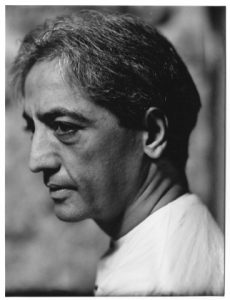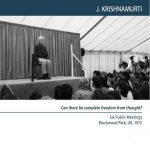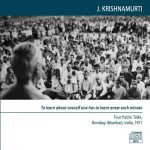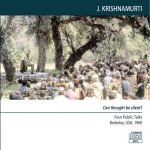Jiddu Krishnamurti

J KRISHNAMURTI is widely respected for his psychological insight. For over forty years his world-wide lectures invited listeners to confront inner reality. As a unique teacher he pointed the way for many to understand themselves and so to develop a richer life. MY Books is proud to be the Krishnamurti Trust’s chosen partner for online digital distribution and sales of the many original recordings made of his talks over the course of his lifetime.
Can There Be complete Freedom Of Thought?
Does learning require thinking, or only awareness?
- To be aware is to be conscious, to be in relationship with what you observe outwardly and also our inward reactions.
- Awareness reveals that I have a conclusion from which I act, which prevents thefree flow of energy.
- You see that you have many opinions and conclusions.
- You don’t know why you have them or how to be free of them.
- Start with not knowing.
- Knowledge is in the past whilst learning is vital, in the present.
- In learning, which is a constant movement, can opinion and conclusion ever beformed?
- Can thought be slowed down naturally? In learning about the function of thought, slowing down takes place without control or effort.
- Can the mind empty itself without effort?
- Do LSD and other drugs slow down the mind?
9 September 1972
- Learning is instant perception and action. What place has thought in learning?
- To learn about freedom must thought be completely silent? Does insight into freedom take time?
- Can thinking, however rational, bring about a psychological revolution in us?
- Is thought always conditioned? Is freedom the non-existence of thought?
- My very being is related to thought. If you want to see something new, what do you do?
- To have insight, let go of the old and listen.
- Learning is not memorizing.
- Q: Is feeling another way of thinking?
- Q: Isn’t the need to love and be loved essential?
- Needing love is love of self.
14 September 1972
- Q: Why don’t we see the division between the observer and the observed?
- How does the division come about which causes conflict and misery?
- Are we aware that we are fragmented? Why does contradiction exist?
- Can we have a mind that is not fragmented and contradictory?
- Can the mind live without comparison?
- The brain sees that nationalities and religious divisions are disastrous for human relationship. What is the capacity that makes the brain see this? Is this awareness? Is this intelligence?
- What is the relationship of intelligence to all that is taking place?
- Intelligence operating has its own action. When there is that intelligence, there is sanity.
- Is intelligence operating in you?
Lorem ipsum dolor sit amet, consectetur adipiscing elit. Ut elit tellus, luctus nec ullamcorper mattis, pulvinar dapibus leo.
The action of intelligence
10 September 1972
- Is thought responsible for fragmentation?
- Does fragmentation have its own activity?
- What is the energy that perceives the total and doesn’t live in fragmentation?
- Does comparison bring about fear and pleasure?
- Is thought seeking security in belief and dogma?
- Can the mind learn instantly all the content of the unconscious in which there are deep, secret fears?
- Does analysis imply time and division? Is consciousness separate from its content?
- To get at the root of fear means learning about not being.
- Q: What about guilt?
To come upon the new, thought must be quiet
16 September 1972
- Q: What is the action that will be a total response to the world around us?
- Can one respond totally without learning about love and death in relation to daily life?
- Do we live, or do we tolerate living?
- Do we live according to ideas and conclusions based on belief, dogma and memory?
- Is there an action which dissipates all images?
- Is love relationship in which there is no image?
- Is disorder relationship in which there is the image?
- Can a mind seeking comfort learn about death?
- Find out whether death is something to be avoided or to be lived with naturally.
- Can the mind free itself from the known?
- Q: What relationship has literature, beauty and art to our daily life?
- Q: Were you conditioned by the Masters?
- Q: Can one help someone in distress?
Direct perception is freedom
17 September 1972
- If one is serious, one must learn for oneself if there is such a thing as the im measurable.
- Thought cannot find the immeasurable because thought is measurement and time.
- Can thought, realizing its limitations, be quiet?
- Can the mind without effort see its content clearly, and the limitation, lack of space and time-binding quality of its consciousness?
- When you say, ‘I do not know,’ does the content have importance?
- There are various systems of meditation, gadgets, yoga, to make the mind quiet. These are unimportant.
- Is truth the very perception of the false? • When the mind has perceived the truth of something, what is time?
- Is there a different dimension which thought cannot touch?
7 February 1971
- Where there is division there must be conflict.
- A mind in conflict must inevitably be distorted and therefore it cannot possibly see clearly what is truth.
- We need a total change, a deep revolution, psychological revolution, the inward revolution, without which you cannot possibly create a new society.
- Is it possible to observe, to perceive without the observer?
- How are images formed? Can the image-building come to an end?
- Knowledge is absolutely necessary.
- Is it possible that knowledge, which the brain has accumulated through centuries, does not interfere with relationship?
10 February 1971
- Can the mind living in this world ever be free, not only superficially but profoundly, at the very root of its existence?
- ‘Freedom from’ is an abstraction, but freedom in observing ‘what is’ and going beyond it is actual freedom.
- How do I observe greed?
- Do I observe it as an outsider looking in or do I observe it without the observer?
- Without the mind being free you cannot live in order.
- Q: Three years have passed;
- I have no energy to be aware of my reactions.
- Q: Can we seek God through observation?
14 February 1971
- To live in this world with intelligence, in spite of all the complications.
- Is it possible to be free of fear, not only the superficial fear in relationship but the deep-rooted fear?
- Thought nourishes, sustains and gives continuity to fear and pleasure.
- When you are learning, your mind is awake.
- Truth isn’t second-hand; you can’t get it through a guru, a book, you have to learn about it.
- The beauty of learning is that you don’t know what truth is.
- What is love?
- A man who has not love in his heart, but the things made by thought, will make a monstrous world, will construct a society that is totally immoral.
- To find out, you must undo everything that you have done. • What does it mean to die?
17 February 1971
- If you can put aside your favourite systems, if you can understand that concentration is merely a resistance and therefore constant conflict and wastage of energy, then we can find out for ourselves what is necessary for a mind that is in a state of meditation.
- To learn about oneself, a living thing, you have to watch, learn anew each minute.
- What is will?
- Consciousness is heritage, the result of time.
- Consciousness is the content of itself, which is time, sorrow, confusion, misery.
- Intelligence has no heritage.
- What is a mind that is completely silent?
- Q: How does one cope with the extraordinary energy that human beings have?
3 February 1969
- The society in which we live is the result of our psychological state.
- Where there is fear there is aggression.
- For most of us, freedom is something that we don’t want.
- Inaction is total action.
- What is the machinery that builds images?
- Questions from the audience followed the talk.



